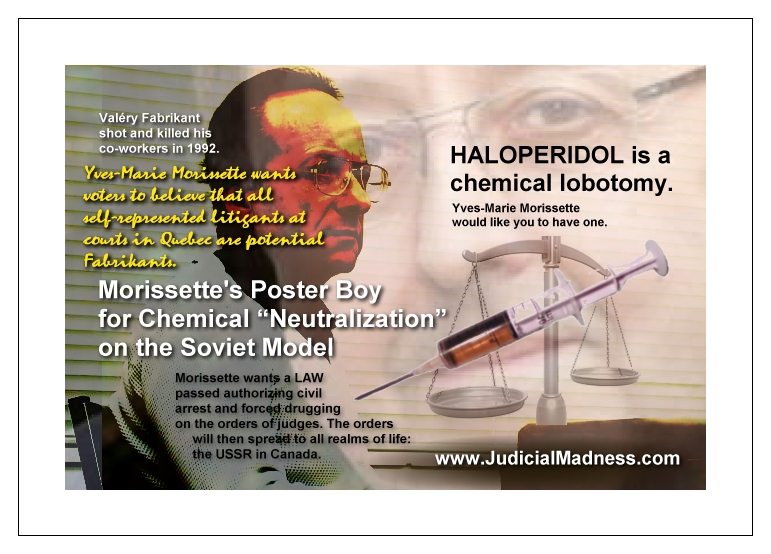Soviet Psychiatry: A Message from Moscow by Alexander Podrabinek
Soviet Psychiatry: A Message from Moscow
An Address to the Psychiatric Community
Being remarks made by Alexander Podrabinek on videotape in Moscow, aired on October 14, 1988 at a symposium of the International Association on the Political Use of Psychiatry held in Washington, DC
INTRODUCTION
by Peter Reddaway
The address that follows is a slightly condensed version of remarks recently made by Alexander Podrabinek on videotape in Moscow. Their intended audience is the world psychiatric community and all doctors and laypeople who are concerned about the perversion of psychiatry for political purposes. The tape was shown on October 14, 1988, at a symposium of the International Association on the Political Use of Psychiatry held in Washington, DC, during, but separately from, a conference of the World Psychiatric Association. The WPA refused to allow the symposium to be part of its program.
Alexander Podrabinek is an auxiliary doctor, the Russian equivalent of an intern, a position above which he has been prevented from rising because of activities as a dissident. He is the author of Punitive Medicine, the widely praised book about politically motivated psychiatry. He completed it in 1977, and an English translation appeared in 1980 (Karoma Publishers, Ann Arbor, Michigan). In 1977 Podrabinek and other dissidents founded the “Working Commission to Investigate the Use of Psychiatry for Political Purposes.” Among the doctors who belonged to the commission was the psychiatrist Anatoly Koryagin, who was jailed for twelve years in 1981,1 but released early last year in an amnesty. He now lives in Switzerland. In 1980–1981 all the members of the commission were jailed for compiling and publicizing documentation on victims of political psychiatry, supporting them and their families and working for their release. Podrabinek was also charged with writing Punitive Medicine. In all, he served nearly six years of imprisonment and exile in 1978–1983.
Since 1987, Podrabinek has edited the weekly samizdat bulletin Express Chronicle, which circulates in about one hundred of the major Soviet cities and has won a high reputation among Western journalists in Moscow. It reports on violations of human rights across the country and provides a platform for free debate on these and related issues. The issue of October 30, for example, carries an analysis by Podrabinek of the draft of the new Soviet electoral laws, in which he criticizes them severely—as does Andrei Sakharov—for being undemocratic. The same issue contains a letter by Sakharov and others, protesting against official distortions of their statements on the number of political prisoners remaining in Soviet jails.
Express Chronicle, like its predecessor the Chronicle of Current Events, also reports frequently on the use of psychiatry, drugs, and mental institutions to suppress dissent. The address that follows generalizes from this mass of information, and is based also on Podrabinek’s work of the last fifteen years on abuse of psychiatry. The immediate impulse behind it is the fear that the USSR may be readmitted to the World Psychiatric Association next October, without decisive measures having been taken to end the abuse of Soviet psychiatry and to create guarantees that it will not be revived in the future. In 1983 the USSR resigned from the WPA when faced with the near certainty of expulsion. Last month it officially indicated its desire to rejoin the world body.
AN ADDRESS TO THE PSYCHIATRIC COMMUNITY
By Alexander Podrabinek
In our country medicine, and in particular psychiatry, is very closely linked to politics. Especially to the politics of bad faith, which does not seek to promote the interests of the people. This of course can lead to notorious abuses.
The abuse of psychiatry is perhaps the most striking example of the entanglement of political and medical interests. Generally speaking, doctors are in some way or other linked with the socio-political life of their country. In particular, matters of public health and its financing are handled, in a normal country, by parliaments and politicians. Unfortunately, in our country not just doctors but also those who hold power practice medicine.
I won’t repeat the well-known facts about the use of psychiatry for political purposes. This abuse has been well documented, and I can only discuss the extent to which it still exists today. It seems to me that this problem continues to exist. Lately the political climate of our country has experienced a definite improvement and the improvements in certain matters have affected psychiatric hospitals as well as the practice of compulsory treatment. But it also seems to me that we have to distinguish real from imaginary improvements. There are actual improvements, but they are surrounded by so much propaganda that they appear greater than they are. Propaganda passes off insignificant improvements that have actually happened as if they were basic changes in the system. I think that it’s necessary here to distinguish one sort of improvement from the other.
For instance, what genuine improvements are there today regarding compulsory treatment? And with regard to the use of psychiatric hospitals for the suppression of dissent?
It’s true that there has been one improvement. In the last two years there’s been a sharp decrease in the number of judicial trials that have led to the committal to “ordinary” or “special” (i.e. high-security) psychiatric hospitals of healthy, or perhaps unhealthy, citizens, on political grounds. That there are fewer trials no one, I think, will dispute. But at the same time, there are still many people in the ordinary psychiatric hospitals. And people are put in them without going through the judicial process. Regulations still exist that provide for the emergency hospitalization of the mentally ill, of those who pose a threat to society. Under these rules it is still possible to bypass the legal system. Therefore the people in power have the opportunity to commit citizens to general psychiatric hospitals without judicial procedures. It is very hard to estimate the number of people who have been committed to psychiatric hospitals in this way. All such estimates would have to be approximate. It is as difficult to estimate this figure as it is to judge whether or not the case is political.
I am aware that particularly in the West people are perhaps prone to simplifying problems. There’s a tendency to paint a black-and-white picture. They think that either the case involves a healthy person who has been committed to a psychiatric hospital for political reasons, or else it is a nonpolitical case. Yet let us assume it is a case involving a person whose behavior leads us to think he is probably mentally ill. People usually prefer not to discuss these kinds of cases. But there are also many people who come into conflict with their local authorities over matters that are not simply political. They are not conducting anti-Soviet agitation and propaganda. It is not even possible to accuse them of anything. But nonetheless these people clash with the local powers who then abuse their positions and their authority to suppress them with the aid of psychiatry.
It’s hard to say whether or not these are really political cases. I’d like to offer you a more general picture. You should examine a wider scope of cases than it was customary to consider in previous years. Then we always said “here’s a healthy person who’s been put in a psychiatric hospital for openly expressing his opinions, for not agreeing with the social system.” There used to be many such cases and there still are some now. But I suggest not just that you consider these cases but, more important, that you examine the ways that standards of medical ethics are maintained in general.
It’s possible to say that the situation regarding open opponents of this social system and open critics of it has improved. At the same time it’s very hard to speak about general improvements in the standards of medical ethics in the Soviet Union, and in particular, those pertaining to psychiatry. I would not want to claim that the situation in this respect really has gotten better. I realize that Soviet propaganda very actively exploits every possible opportunity to rehabilitate itself in the eyes of world public opinion. It clearly wants to increase its prestige abroad. For the prestige of Soviet psychiatry, for example, in the spring of this year a new statute was adopted regarding psychiatric hospitals and psychiatric treatment. Essentially this statute does not differ from the previous situation. In fact, it’s based on the old administrative rules, which did not even have the power of law. They were merely regulatory directives. Now they’ve just been codified and made accessible to a wider audience. They’re available for anyone to read. This is called a success of glasnost.
In fact, this new statute has not in any substantial way improved the rights of those citizens who are subjected to psychiatric examination. There may be some positive features here from the legal point of view. But such positive legal features existed before as well. For example, in the old directives governing psychiatric hospitalization there was a clause stipulating that anyone forcibly committed to a psychiatric hospital must be examined by three psychiatrists within a twenty-four–hour period. In theory this is not a bad idea. It wouldn’t be a bad idea in a lawful country. Unfortunately, the Soviet Union is not that kind of country. The laws here have always been broken. And they continue to be broken today. In a country where the law is subordinated to ideology, it’s a tradition to break them. It is also possible to pass plenty of good laws. In the Soviet Union even now there are plenty of such laws, not only regarding psychiatry. We do have good laws, but they are never observed. Therefore one cannot say that the situation has improved just because a new law has been passed. That would have been fair to say about any country with the rule of law, where those in power must respect the law, where the law ensures genuine accountability.
Recently a new law has been introduced regarding the responsibility of psychiatrists for illegal and unjustified detentions in psychiatric hospitals. It would seem that we should applaud this development. Psychiatrists should be held responsible by the criminal law for abuses. Yet at the same time, it is worth recalling that before 1969 the criminal code contained a very similar article: namely, Article 148 of the old Stalinist criminal code. Even as early as the 1960s it didn’t hinder the internment of political opponents of the Soviet system in psychiatric hospitals. This practice was employed then, despite the existence of such a fine article as 148. Now, a new one has been introduced. So far there has not been a single case in which anyone has been prosecuted, despite the fact that cases of psychiatric abuse continue.
The arrangements for compulsory psychiatric treatment have been amended. According to the new statute and to the amendments that were introduced in the new legislation “special” psychiatric hospitals no longer exist. The administration of these psychiatric hospitals has now legally been transferred from the Ministry of Internal Affairs to the Ministry of Health. This would seem to be a step forward. Naturally psychiatric treatment should be performed by doctors and not by the police or by soldiers. However this change remains only on paper. The Special Psychiatric Hospital in Leningrad is still guarded by men in uniform, as before. This is the current reality.
A week ago my friends in Leningrad received an answer to their inquiry regarding Alexander Kanatov, who is confined to the Special Psychiatric Hospital in Dnepropetrovsk. Of course this hospital is no longer considered “special.” But in reality they are preserving the old system just as it was before. In responding to their inquiry, even the prosecutor’s office refers to this hospital by its old name: as a “special psychiatric hospital.” Perhaps the regional prosecutors are not participating in perestroika. Maybe they are not taking much part in the democratization process that’s underway in the highest echelons of the state. These regional officials still call things by their real names.
I hope you will carefully examine the changes that are going on in this country. Are these changes genuine or are they imaginary?
The propaganda efforts that the Soviet government and Soviet psychiatry are currently conducting are undoubtedly directed toward regaining a place for the Soviet Society of Neuropathologists and Psychiatrists in the World Psychiatric Association. I know that in the West, in particular in the American Psychiatric Association and in the World Psychiatric Association, this issue is now being given much discussion and debate. And that they are considering the conditions under which this return would be possible. As for my own thoughts on this matter, it seems to me that the Soviet side must fulfill three fundamental conditions.
First: there must be a release of all political detainees from psychiatric hospitals—of both the special and the ordinary types.
Second: Soviet psychiatrists and the Soviet government must officially and publicly admit that there have been psychiatric abuses in the past. That is, if indeed they belong to the past, and are not continuing today.
Such an acknowledgment would represent a kind of moral compensation for the victims of psychiatric persecution. Moreover, this kind of public repentance would be a confession before the people of the state’s guilt, not just of its political guilt but of its human guilt. To a certain extent it would be a pledge that the system would not be revived.
If the Soviet authorities claim in private that they will no longer employ methods of psychiatric persecution but that they’d rather not declare this publicly, then we can interpret this as their desire to return to the system whenever they wish to. This sort of claim can only be regarded as a propaganda measure.
A third condition appears to me to be necessary, although I know that the American Psychiatric Association does not consider it essential. At least those Westerners with whom I’ve discussed this criterion believe that it is perhaps unnecessary. They regard the other requirements as sufficient. However, I do think it’s necessary to create an independent public commission that would have the power to monitor the psychiatric hospitals. The commission could be made up in various ways. The most acceptable commission, in my view, would consist of psychiatrists from the Soviet Union and from the World Psychiatric Association, and it would also have independent public figures—Soviets and Westerners. These would be people who have dedicated much time and energy to the subject, and who have proven themselves competent in the field. I am returning here to the question with which I began, the fact that the use of psychiatry for political objectives is not merely a medical issue because it also has definite political aspects. Therefore in order to find a solution to this problem the commission should include public figures as well as doctors.
I think that such a commission should also include members of the press. On the Soviet side, in addition to psychiatrists, the commission should have people who have demonstrated their political independence and who are knowledgeable about these matters.
The commission would have the authority to inspect Soviet psychiatric hospitals. Members could freely visit and review patients’ records while also observing medical ethical standards and preserving patient–doctor confidentiality. I think that the existence of such a commission would guarantee that psychiatric abuses would not occur.
In this connection I would like to remind you that in 1977 the Hawaii Resolutions (of the World Psychiatric Association) were adopted, which provided for the creation of such a commission within the framework of the World Psychiatric Association. In 1977, many people came to me since I was active [with other Soviet dissidents] in the “working commission to investigate psychiatric abuse.”2 Inspired by the decision to create this commission, they approached it for help. The commission had not yet been formed, but many people came to us with their woes, their protests, their requests to undergo psychiatric examinations or to have their cases investigated or to have us visit the hospitals where they were. They appealed to the WPA commission.
As far as I know this commission has not been established to this day. 3 I consider it essential that it be created and given permanent representation in the Soviet Union. It should conduct frequent inspections with the cooperation of both Soviet and Western public figures. This would be the best guarantee that psychiatric abuses would not resume, and that the last political detainees would be released from psychiatric hospitals.
These, in my view, are the three conditions that must be fulfilled.
Finally I will address a few of the questions that journalists always ask and that interest so many people. The first question is about how the situation for psychiatrists has changed after the Snezhnevsky school lost its influence in Soviet psychiatry.4 This change occurred when (in early 1988) the diagnosis of “sluggish schizophrenia,” which was often applied to political dissidents, was rejected for its ambiguity. The second question is about the number of political detainees in Soviet psychiatric hospitals.
The fact that those people who were diagnosed as having so-called sluggish schizophrenia are quickly being removed from the state psychiatric register does not by itself tell us anything. For example, in Leningrad, the Snezhnevsky school was unpopular, and the diagnosis “sluggish schizophrenia” was unpopular. Nonetheless, this didn’t prevent Leningrad doctors from committing political opponents of the regime to psychiatric hospitals. To detain critics in psychiatric hospitals they could use any number of diagnoses.
For the purposes of falsification it’s hardly important whether a person is diagnosed as having “paranoid schizophrenia” or “sluggish schizophrenia. They can write up the diagnosis as any psychiatric illness. Still, I think that, from a medical point of view, the rejection of the diagnosis “sluggish schizophrenia” is certainly a step in the right direction.
Now to the second question: How many political detainees are currently being held in psychiatric hospitals in the Soviet Union?
It is impossible to answer this question precisely. Ten years ago, we had our dissidents’ commission. There were many of us, but we were able only to estimate approximately the number of political prisoners in psychiatric hospitals.
In order to calculate this number accurately we must institute regular inspections of all psychiatric hospitals. We must have the right to enter them freely and to examine the records, both medical and judicial documents, including court decisions. We must be permitted access to the documents in court archives. Only in this way would it be possible to assess the real situation. Only then could we find out how many political detainees there really are.
At present we know that many political prisoners are being released from psychiatric hospitals. From the “special” hospitals they are transferred to the “ordinary” kind, and from the ordinary hospitals they are then released. At least this is what we have been hearing. Yet at the same time, I should cite the example of a political prisoner named Leonid Dobrov who escaped in April from a psychiatric hospital in Kishinev, in the Moldavian republic. He had obviously been committed on political grounds. I won’t tell his story here because it’s well known.5 But he told us about seven detainees in the Dnepropetrovsk special psychiatric hospital where he had spent several months. This was the first we’d heard of them. It means that we only find out about such people accidentally. We don’t have any monitoring system that could enable us to know about every detainee. The means of communication in our country are extremely poor. Links between people and among social groups are not destroyed by accident. They are destroyed by the state.
The state creates all kinds of barriers to hinder the flow of information regarding political prisoners. Therefore, in order to say anything true about the situation, such as how many political detainees there really are, we need to create an official and competent commission. To reiterate, this commission would preferably be made up of Western and Soviet psychiatrists, Western and Soviet public figures, as well as dissidents, all of whom could evaluate matters here firsthand. Commission members would be able to visit psychiatric hospitals. They would be able to meet with the patients. Thus they would be able to arrive at their own conclusions. I consider these conditions to be the minimum requirement. They are the three criteria that the Soviet Society of Neuropathologists and Psychiatrists must meet before it is received back into the World Psychiatric Association.
– translated by Andrew Meier
1. See my article “The Case of Dr. Koryagin,” The New York Review (October 10, 1985).
2. On this commission of dissidents see the introduction above.
3. This is not correct. The commission began to function in 1979, but its activities were limited by Soviet refusals to cooperate with it satisfactorily.
4. Andrei Snezhnevsky (1904–1987) was made the czar of Soviet psychiatry in 1950. His psychiatric theories were subsequently given a near-monopoly status in the USSR.
5. See for example the detailed account published in the Baltimore Sun. October 19, 1988.<.sup>




